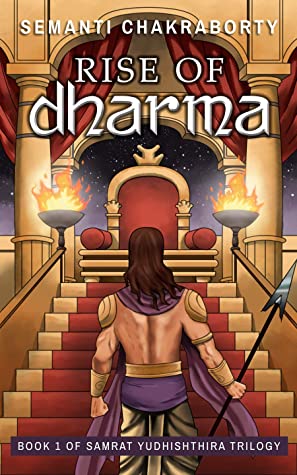Yudhisthira is the eldest son of the exiled King Pandu and his first wife Kunti. Born in a forest, life is idyllic, until one day when Pandu and his second wife Madri suddenly pass away. Orphaned at a young age, Yudhisthira and his four brothers go back to Hastinapur with their mother, hoping for some love and affection from their paternal family. It is the capital city from where his father once ruled.
However, Hastinapur is no longer the place that his parents had left years ago. His blind uncle Dhritarashtra rules there as the regent. The presence of Grandsire Bhishma and Uncle Vidura is warm and assuring. But his hundred cousins led by their eldest Duryodhana now dominate the environment.
Hostility between cousins takes birth as the five brothers – collectively called the Pandavas after their father – try to become a part of the Hastinapur household. All the more, because Yudhisthira is the eldest of all the progeny. This means he is a contender for the throne which Duryodhana has believed to be his all his life. Tragedy after tragedy befalls them, and they escape death narrowly few times. Yudhisthira realizes Duryodhana would never let them live in peace.
Right when darkness engulfs them, Krishna, the Yadava chief and Kunti’s nephew, and Draupadi, princess of Panchal come to their lives as a ray of hope.
After much ado, the kingdom is divided, and the Pandavas are duped with an arid land. To avoid conflict, Yudhisthira agrees and settles at Khandavprastha. But peace is still far away.
Rise of Dharma by Semanti Chakraborty is the first of three-part book series on the Mahabharata from the perspective of Yudhisthira. The eldest Pandava has generally been less explored in literature related to the epic. Few people know that it is he who is the core protagonist of Vyasa’s magnum opus. In the literary arena, his famed brothers and wife take away the limelight. As a result, Rise of Dharma comes as a welcome read. All the more, because it remains true to the Sanskrit canon in most parts.
Yudhisthira, as Vyasa described him, is a man difficult to understand. Or more aptly, difficult to relate to, in today’s time. He was honest to a fault and had a penchant for always trying to see good in others even in dire circumstances. This quality of his is often misinterpreted in popular retellings as foolishness. Vyasa, however, had described him as a wise man of immense intellect and political acumen.
Additionally, he had a unique quality. It was his unflinching adherence to his Dharma. Now, what “Dharma” truly means is still a matter of debate among the scholars of Mahabharata. It could mean duty or righteousness depending on the context. The definition of what constitutes “duty” often varies from person to person. It is here, Yudhisthira, despite being a good man at heart, becomes morally ambiguous at times. As his fixation to always do what abides by Dharma sometimes leads him to glory and other times, to his doom.
Semanti Chakraborty has captured this unique combination of innate goodness, optimism and intelligence of Yudhisthira very well. The portrayal of his mental exhaustion and reluctance in being the decision maker is commendable. His moral ambiguity, however, will come in the later parts of the series.
The childhood of the Pandavas and Kauravas is engaging. The author portrays Yudhisthira’s lack of interest and skill in archery, and overall military prowess with honesty. It is interesting to see how he warms up to the spear, a weapon normally used by common foot soldiers. Yudhisthira’s first duel with Bhurisravas during Rangbhoomi on spear is spectacular to read. So is the Gurudakshina war.
The politics that marred the Kuru household is aptly pointed out. Semanti has hit the nail in its head regarding Duryodhana’s dubious claim to the throne and the role of Karna in his life. Special mention to Draupadi’s Swayamvar here. The author has depicted the older variant of Karna’s participation in the Sanskrit Mahabharata, opposed to the popular one known via televised versions. This is a feat only few authors have been able to do in recent times. Another part of the novel that I liked was the building of Indraprastha and the role of Krishna, the Pandavas and particularly, Draupadi in it.
The language is simple, smooth and to-the-point, making it easier to sail through the story. The author has felt every emotion of Yudhisthira while penning down this novel. The outcome is a very heart-touching tale of a hero often ignored. But at times, too much attachment to the protagonist can translate to borderline indulgence. A little more nuance was needed here. I wouldn’t say there is none…but a tad bit more would have given an edge to the characters and the story.
Overall, Rise of Dharma is a good read.
Image Courtesy: Goodreads
For more such reviews, please go to Book Reviews.
